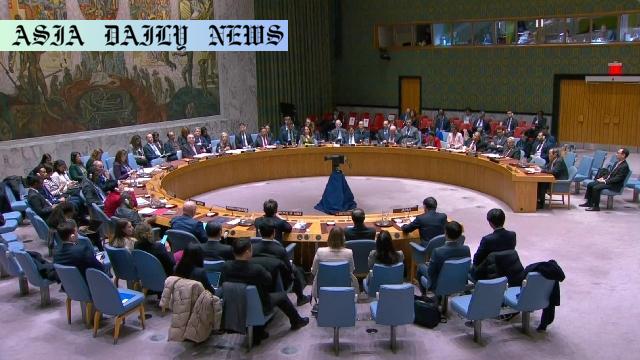Tariffs: China calls for a UN meeting to address US trade policies
- China has requested a UN Security Council meeting to discuss US tariffs.
- China alleges US tariffs violate international trade rules.
- The meeting aims to raise awareness of unilateral policies and promote multilateral dialogue.

China’s Initiative to Address Tariffs at the UN
China has intensified its opposition to the United States’ tariff policies by calling for an informal meeting at the UN Security Council. The country has reportedly invited all 193 UN member states to join the discussions, focusing on the ramifications of the US’s unilateral trade measures. Notably, the meeting has been strategically scheduled to occur amid growing tensions in the global trade environment and international calls for cooperation and dialogue.
Tariffs and Their Global Impact
The crux of China’s argument revolves around the claim that the US’s tariff measures have destabilized the global economy and undermined the multilateral trading system. According to a note from China, the act of “weaponizing tariffs as a tool of extreme pressure” is a breach of international trade norms and has generated severe turbulence. This stance underscores the broader concerns about the dangers of unilateral actions and their long-term consequences on international trade and economic growth.
China’s Call for Multilateral Discussion
Chinese Foreign Ministry Spokesperson Lin Jian emphasized the importance of addressing the issue on international platforms such as the UN Security Council. Lin stated, “We support the international community in leveraging various platforms… to foster discussions and deepen understanding of the dangers of unilateralism and bullying.” By raising this issue at a prominent global forum, China aims to elevate international awareness and seek collective solutions to mitigate the risks posed by such policies.
International Reactions and the Path Forward
The international community’s reactions to China’s initiative are likely to be mixed. While some nations may support China’s critique of unilateral trade measures, others could view this as a strategic move to bolster China’s global standing. The proposed meeting provides an opportunity to assess the broader implications of the US trade policies and facilitate constructive dialogue to ensure a balanced and equitable international trading system.
The Larger Implications for Global Trade
China’s move to involve the UN Security Council highlights the urgency of addressing the challenges posed by protectionist and unilateral measures. As the global economy grapples with uncertainty, the need for cooperative and inclusive frameworks becomes paramount. This meeting could serve as a wake-up call for the international community to prioritize fair trade practices and strengthen multilateral institutions to safeguard global economic stability.



Commentary
Understanding China’s Strategic Move
China’s decision to elevate the issue of US tariffs to the UN Security Council is as much a political statement as it is an economic one. By calling for a global discussion on the topic, Beijing is signaling its disapproval of unilateral trade policies and affirming its commitment to multilateral dialogue. This approach is particularly noteworthy given China’s positioning as a key player in the global economy.
Broader Implications for International Trade Rules
The use of tariffs as a political and economic tool is not new, but the scale and intensity of the US’s actions under the current administration have drawn sharp criticism. China’s focus on the “weaponization of tariffs” sheds light on a critical issue: the undermining of established international trade norms. By bringing this to the UN platform, China hopes to galvanize global opinion and encourage a more balanced approach to international trade policies.
A Positive Step Toward Multilateral Solutions
While China’s initiative may be viewed through a geopolitical lens, its emphasis on fostering multilateral dialogue is undeniably significant. In a time marked by increasing protectionism and economic nationalism, discussions like these are essential for promoting cooperation and understanding among nations. If successful, this meeting could set a precedent for addressing similar challenges in the future.